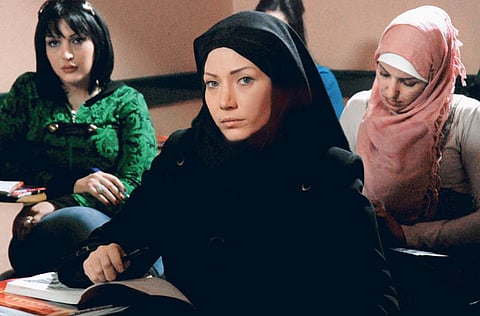Syrian TV drama draws furious calls from critics
Soap opera presents idea of religion as a double-edged weapon

Beirut: In a new Syrian soap opera, a beautiful green-eyed young woman named Laila is torn over whether to take off the niqab, the billowing black Islamic garb that hides every part of her except her eyes.
"I cannot take this pressure anymore," she says in one episode. "I want to take off the veil."
But her rebelliousness has unintended consequences: She is shunned by society, her mother refuses to take her calls and her brother plots her death.
The 30-episode drama, aired on state TV during Ramadan, has sparked intense debate in this Arab nation of 22 million, which is ruled by a secular, regime that has clamped down on extremism in the past.
Distortion
The series, titled Ma Malakat Aymanukum, Arabic for What Your Right Hand Possesses, has drawn furious calls from critics who say it distorts Islam's image and praise from others who say it is a realistic portrayal of a sometimes hypocritical Muslim society.
The controversy illuminates a fundamental discord within Syria, which supports groups like Hamas and Hezbollah in their fight against Israel but maintains strict secularism at home.
In July, the government banned students and teachers from wearing the niqab in order to protect Syria's secular identity.
The show's director, Syria's most renowned film and TV soap opera director Najdat Anzour, defended the new series, which he said is based on a true story.
"The show presents the idea of religion as a double-edged weapon. If religion is not taken correctly, it could be easily exploited by certain groups to separate members of the same community and create hostility and sectarian violence," Anzour told The Associated Press.
"It does not aim at reflecting negative aspects of Arab society, but to portray a panoramic drama of an Arab society that is eroding from the inside," he said.
The series also touches on sensitive issues such as prostitution, extramarital sex and terrorism.
Laila's brother pretends to be a devout man while in fact he has an adulterous affair with a school girl. He plots to kill his sister and eventually becomes a jihadist who blows up civilians in Iraq, Syria and Afghanistan.
Alia, another main character, loses her virginity, throwing her into fear and guilt until eventually she decides to undergo a surgical procedure that would restore her hymen.
Four decades of secular rule under the Baath Party — a socialist party founded by a Christian politician in the 20th century — have largely muted sectarian differences in Syria. Also, the state is quick to quash any dissent. In the 1980s, Syria's military killed hundreds in crushing a bloody campaign by Sunni militants to topple the regime of then-President Hafez Al Assad.
Syria has long been viewed by the US as a potentially destabilising force in the Mideast. An ally of Iran and Hezbollah in Lebanon, it has also provided a home for some radical Palestinian groups.
The country is now trying to emerge from years of international isolation. The US reached out to Syria this year in the hopes of drawing it away from Iran, Hezbollah and Hamas.



